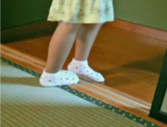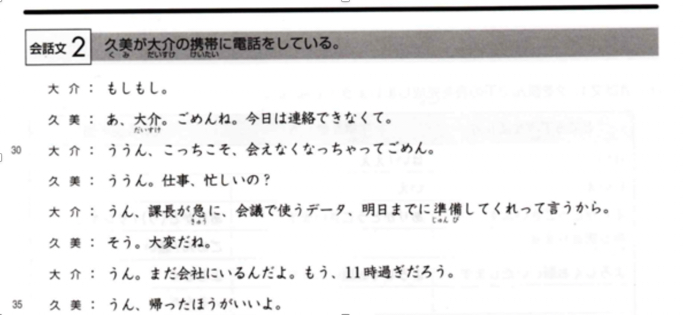上級へのとびら CH2−9 (会話文2 /P35)
「金色夜叉」 尾崎紅葉
“The Golden Demon” by Koyo Ozaki
キーワード / Keywords:
蹴飛ばす(けとばす) kick
銅像(どうぞう) bronze statue
秀才(しゅうさい) smart
引き取る(ひきとる)take in the orphan
承諾(しょうだく)agreement
美貌(びぼう) beauty
物足りない(ものたりない) not enough
高利貸し(こうりがし) loan shark
復讐を誓う(ふくしゅうをちかう)decide to revenge
殺人事件(さつじんじけん)homicide
昼ドラ soap opera
不幸(ふこう)misfortune
後悔(こうかい)regret
恨みを買う(うらみをかう)resentment
胃がん(いがん)stomach cancer
はしたないshameful
文化が根付く(ぶんかがねづく)deep-rooted culture
当たり前(あたりまえ)obvious
敷居が高い(しきいがたかい)hesitate to (Shikii is the rail for door as below)
“I am not good enough for that”

If you would like to do “Listening Challenge, please do not read the English translation below!
尾崎紅葉「金色夜叉」The Golden Demon by Koyo Ozaki
尾崎紅葉は、女性のような名前ですが男性です。
The name of “Koyo Ozaki” sounds like a woman’s name, however, he is a man.
1868年生まれの小説家で、弟子には泉鏡花や田山花袋がいました。
He was writer who was born in 1868. His apprentices are Kyoka Izumi and Katai Tayama.
尾崎紅葉というと、私は静岡県の熱海温泉を思い出します。
When I hear about Koyo Ozaki, the first thing that comes to mind is the statue in the Atami hot springs in the Shizuoka prefecture.
そこには、男性が女性を蹴飛ばしている銅像があるんです。
There is a bronze statue of a man kicking a woman.
子供の時には家族でよく熱海温泉に行きましたが、その銅像を見て、「ひどい男だ」と思っていました。
I often visit Atami hot springs with my family, looked at the bronze statue and thought, “He is a terrible man.”
この銅像は、尾崎紅葉の代表作、「金色夜叉」の貫一とお宮です。
This statue is the Kanichi and Omiya in The Golden Demon by Koyo Ozaki.
「来年の今月今夜のこの月を僕の涙で曇らせてみせる」と貫一がお宮に言います。
Kanichi said to Omiya, “I will make tonight’s moon dirk with my tear next year in the same month, same day.”
お宮は一体何をしたというのでしょうか?
What on earth did Omiya do to him?
あらすじはこうです。
The story goes like this.
貫一は秀才だが15歳で両親がなくなり、裕福な家庭のお宮の家に引き取られます。
Kanichi is a smart boy who lost both parents when he was fifteen years old. Then, Omiya’s wealthy family welcomed him as one of their own.
お宮の両親は、貫一とお宮を結婚させることにし、二人もそれを承諾しました。
Omiya’s parents decided to marry Kanichi and Omiya, and the two of them agreed to it.
しかし、ある時銀行家の息子で大富豪の富山がお宮の美貌に一目惚れし、結婚を申し込みます。
However, Tomiyama, the son of wealthy family that’s owns a bank, falls in love with Omiya at first sight, so he proposed to her.
お宮は、以前から貫一では物足りないと思っており、富山の金に目がくらみ、富山と結婚することにしました。
Omiya believed that Kanichi was not good enough for her. She decided to get married with Tomiyama since she was attracted by his money.
そこで怒った貫一が、お宮を蹴飛ばした、というのがこの熱海の銅像です。
Then, Kanichi was angered and kicked Omiya. That is this bronze statue in Atami.
振られて悲しいのはわかるけど、やっぱり女性を蹴飛ばしたらダメですよね。
I understand that he was sad because he was dumped by her, though it’s still not a good reason to kick a woman.
貫一はエリートコースを進むはずだったけれど、お宮を金持ちの富山に取られたことから、高利貸しになって人から嫌われるような仕事をします。
Kanichi was supposed to become an elite person, however, he became a loan shark and did things that made people hate him. It’s all because Omiya was taken by the wealthy man, Tomiyama.
そして、いつか富山とお宮を復讐をすることを誓う、という話です。
It is the story that Kanichi decided to take revenge on Tomiyama and Omiya someday.
そう言えばこういう話、私の母がよく見ている殺人事件の昼ドラに似ているような。。。
When I think about, I feel like my mom often watches homicide dramas has a similar story line.
お宮はお金持ちになったものの、美女好きの富山は結婚後はお宮に対する愛情はなく、子供は死んでしまい、お宮は不幸な暮らしをします。
Meanwhile, Omiya becomes a wealthy madam, though Tomiyama, who likes beautiful ladies, did not have any affection toward Omiya. Their child died of sickness and Omiya ended up living a lonely life.
そしてお宮は、お金に目がくらんで貫一と別れたことを後悔します。
Then, Omiya regrets that she dumped Kanichi because of money.
貫一が働く高利貸し屋のオーナーは、いろんな人から恨みを買い、高利貸し屋を使ってお金を全て無くした女性に家に火をつけられて死んでしまします。
The loan shark owner whom Kanichi works for has many enemies dies because a woman who lost all her money because of their business set fire to his house.
一方、貫一は高利貸しで成功します。
On the other hand, Kanichi becomes successful from the loan shark business.
お宮は貫一に許してくれるように何度も手紙を書くけれど、貫一は許してくれません。
Omiya asked Kanichi to forgive her, and sent many letters to him, however, he does not forgive her.
しかし、貫一が手紙を読むようになってきたところで、話が途中で終わってしまいます。
However, the story suddenly ends when Kanichi started reading the letters from her.
作者の尾崎紅葉が、37歳の若さで胃ガンで亡くなったのです。
It’s because the writer, Koyo Ozaki died when he was 37 years old due to stomach cancer.
尾崎紅葉が生きていたら、どんな話にしていたと思いますか?
How do you think the story would have ended if Koyo Ozaki was alive.
この話のテーマは、「精神的な豊かさは、お金では手に入らない。」です。
The theme of this story is, “You can’t get happiness from money.”
私の個人的な意見ですが、日本人はお金持ちになろうとすることは、はしたないこと、という文化が根付いている気がします。だから、お金持ちになろうとしたら、その分嫌なことが起こる、というストーリーが多いのかもしれません。
In my opinion, Japanese people tend to think that it’s shameful to try to get more money they can get. Therefore, there are many stories which imply “If you try to be wealthy, you have to get something bad as well.”
アメリカでは、株は当たり前のもののように捉えられていますが、日本では株を買うのに大体100株まとめて買わないといけないので、10万円から100万円必要で、初めて株を買うには敷居が高いです。
In America, buying stock is not so special, however, in Japan, it’s not so easy for average people to start buying stocks since we need to buy more than 100 stocks together, so we need to pay at least 100,000 yen to 1,000,000 yen (about $1000 to $10,000) to begin with.
それもあってか、一株、10ドルからでも株を買えるアメリカと違って、日本では株を買うことはリスクが高いと思われています。
Maybe because of that, Japanese people think it’s very risky to buy stocks. That is different from America where we can buy a stock from $10.
だから、株を買う人というのは、リスクが高いことをするカジノ好きな人、または、すごくお金を持っている人、と思われる傾向があります。
So people tend to think that people who buy stocks are ones who like risky things such as playing at a casino, or one who is very wealthy.
私は時々、「あーあ、朝起きたら、ウォーレンバフェットになってたらいいのに!」と言っていますが日本ではこういうことは言わないようにしようと思います。
I sometimes say, “Ah, I wish I became Warren Buffet when I wake up!” I will try not to say those kinds of things in Japan.
CH2−9 (会話文2 /P35)

久美が大介の携帯に電話をしている。
Kumi calls Daisuke’s cell phone.
大介:もしもし。
Daisuke: Hello?
久美:あ、大介。ごめんね。今日は連絡できなくて。
Kumi: Oh, Daisuke. Sorry I couldn’t contact you today.
あ、大介さんでいらしゃいますか?申し訳ございません。本日は、ご連絡できませんで。
大介:ううん、こっちこそ、会えなくなっちゃってごめん。
Daisuke: No problem. Sorry that we ended up not being able to see each other.
いいえ、とんでもないです。こちらこそ、お会いできなくて、申し訳ございません。
久美:ううん。仕事、忙しいの?
Kumi: That’s okay. Are you busy with work?
いいえ、お仕事、お忙しいんですか?
大介:うん、課長が急に会議で使うデータ、明日までに準備してくれって言うから。
Daisuke: Yeah, because my section chief suddenly told me to prepare the data for the meeting by tomorrow.
はい。私どもの課長が急に会議で使うデータを明日までに準備するようにと、申しますから。
久美:そう、大変だね。
Kumi: Really? That’s too bad.
それは大変でございますね。
大介:うん。まだ会社にいるんだよ。もう11時過ぎだろう。
Daisuke: Yeah. I’m still at work. It’s probably past 11:00 already, right?
そうですね。まだ会社におります。もう11時過ぎですよね。
久美:うん、帰ったほうがいいよ。
Kumi: Yeah, you should go home.
はい。もうお帰りになった方がいいですよ。

大介:うん、でもまだちょっとしなきゃなんないことがあるんだ。
Daisuke: Right. But I still have a few things that I have to do.
はい、でもまだ少々、しなければいけないことがございます。
久美:そう。あんまり無理しないでね。
Kumi: Really? Don’t push yourself too much.
そうですか。あまり、無理なさらないでくださいね。
大介:うん。すっごく疲れてるけど、がんばる。
Daisuke: Yes, I’m really tired, but I’ll do my best.
はい。とても疲れておりますけれど、頑張ります。
久美:明日の夜、会える?どっかにおいしいもの食べに行こうか。
Kumi: Can we meet tomorrow night? Shall we go eat something good somewhere?
明日の夜、お会いしたいのですが、ご都合はいかがですか?何か美味しいものを食べに参りましょうか。
大介:うーん、まだわかんないな。でも、早く会社を出られそうだったら、電話するよ。
Daisuke: Well… I don’t know yet, But I’ll call you if it looks like I’ll be able to leave work early.
まだ予定がわかりかねます。けれど、早く会社を出られそうでしたら、お電話いたします。
久美:でも、今、私、ケータイないんだ。
Kumi: But I don’t have a cell phone now…
けれど、今わたくし、携帯を持っておりません。
大介:あ、そっか。じゃあ、5時頃そっちから電話してよ。
Daisuke: Oh, right. Well then, give me a call around 5:00.
そうですか。それでしたら、5時ごろそちらからお電話いただけますか?
久美:うん、わかった。じゃあ、その頃電話するね。
Kumi: OK, got it. I’ll give you a call around then.
はい、了解です。それでは、その頃お電話いたします。
大介:オッケー。じゃあまた明日。
Daisuke: OK. I’ll talk to you tomorrow.
わかりました。それでは、また明日お目にかかります。
久美:うん、仕事がんばって。
Kumi: Yeah. Good luck with work!
はい。それではお仕事頑張ってください。
大介:サンキュー!39
Daisuke: Thanks!
ありがとうございます。